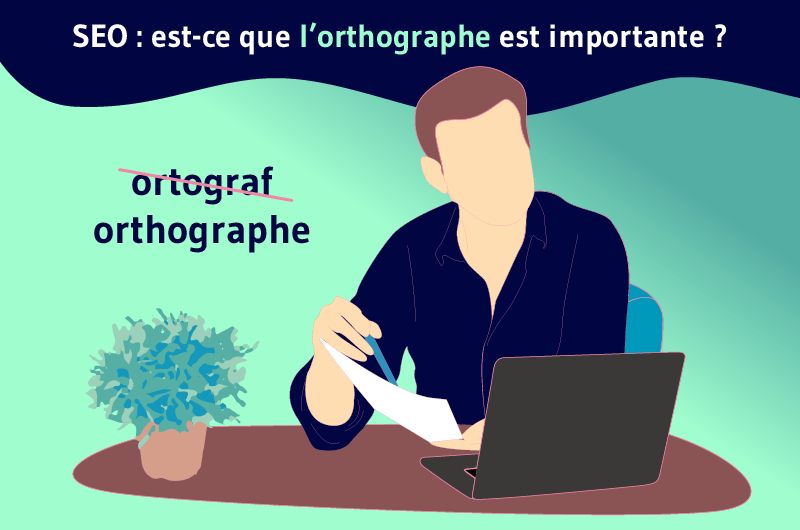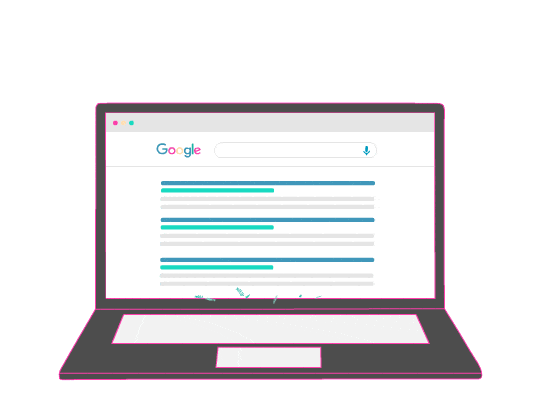Guest article by : Grégoire d’Aboville, Head of Growth of MerciApp (spelling correction solution)
Having trouble with spelling?
Don’t worry, you are not alone
According to the Voltaire Project, the French only master on average 45% of the rules of spelling, conjugation and grammar.
But, can leaving spelling mistakes in your content penalize your natural referencing?
In this article, we explain in detail what Google has said on the subject, how spelling impacts your SEO, and how to tackle the problem head on.
What does Google say about spelling?
To find out what Google thinks about spelling and how it takes it into account in its algorithm, we looked at the communications of the search engine.
And we started with the “Search Quality Evaluator Guidelines”.
Search Quality Evaluator Guidelines
What are the SQEG?
The Search Quality Evaluator Guidelines are an official guide published by Google to define internally what good content is.
If you have never consulted them, they are available on this link.
These guidelines are used by search quality raterspeople in charge of evaluating the quality of Google results manually.

This document is key in SEO, because it clearly explains, with words accessible to all, what Google considers as quality content. It is therefore one of the few official and public sources that the engine makes available to webmasters to understand how Google evaluates web content.
What does the SQEG say about spelling?
These guidelines do not directly mention spelling as a criterion of content quality.
But, poor spelling and grammatical errors are cited several times as a reason why some content is of poor quality.
Here is an example taken directly from the guide provided by Google (French translation of the highlighted passage: the page has many spelling mistakes, typos and grammar errors).
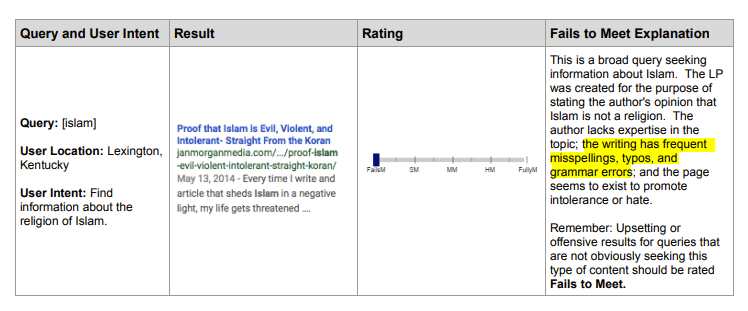
From this document, we can see that Google does not look kindly on grammar and spelling errors.
The guide for beginners in natural referencing
And this is not the only document in which Google refers to spelling..
The search engine also provides content creators with an official guide that mentions the subject.
What is this guide offered by Google?
Again, we did not choose this resource at random.
It is an official resource made available to webmasters directly by Google to help them progress in SEO.
It is even more important because it is the only guide on SEO provided by Google to webmasters.
What does the official Google guide say?
In its guide, Google mentions spelling once.
In the section, “Understanding what your readers want (and meeting their needs)”, it is specified in the category “to avoid”:

So Google once again seems to consider spelling to be an important criterion in evaluating the quality of content. This suggests that it could be an important ranking criterion in SEO.
Spokesperson communications
To understand whether spelling is a ranking criterion (along with links or match with search intent, for example), we need to go back a bit.
In 2011, Matt Cutts, then Google’s spokesman to webmasters, addressed the subject in a video.
His answer on the subject is clear: Google considers that spelling is indeed a sign of quality… But it is not part of the algorithm. In other words, Google does not directly consider spelling when deciding whether a page deserves to be in the top results.
Let’s take a quick break.
Upon reflection, Google’s official positions seem somewhat contradictory. On the one hand, the engine recommends paying attention to spelling, but on the other hand, it does not include it in its evaluation criteria.
Strange!
Why this position?
Google’s difficulties with spelling
To understand why Google doesn’t include spelling in its algorithm, we need to dig a little deeper into how it works and its own constraints.
-
Multi-lingualism
First of all, we have to remember that Google is available in 192 countries around the world, many of which have their own local language.
If Google wanted to take spelling into account in its ranking criteria, this would mean that the company would have to be able to analyze and evaluate the spelling of dozens of different languages.
This difficulty is recalled in a film that Google published in 2020 to share some of the basics of its operation and internal organization. Google must offer a universal system that provides results of equivalent quality in all countries.
Technically, this task seems to be very difficult for Google… Unless it has a magic wand?
-
The limits of machine learning
When it comes to judging spelling, Google has a strong ally: machine learning.
If you use Google products like Gmail or Google Docs, you must have noticed how much progress the company has made in detecting typos and spelling and grammar errors.
But for all its progress, Google faces a limitation: that of the capabilities of machine learning to understand language.
To “learn spelling”, Google scanned millions of lines of text (no doubt retrieved from Wikipedia or from books digitized by the company). It has thus stored a huge stock of French content. On this basis, Google is able to make statistics and deduce with some confidence the writing of words, the basic conjugation rules and the basics of grammar.
But, unfortunately, this method is not infallible, for two reasons.
The first is that there is no text that can be guaranteed to be free of errors. Among the contents that Google has ingested, there are inevitably errors that Google integrates despite itself.
The second is that the context of language is changing. New expressions emerge every day. Some authors also have their own unique style. In other words, some formulations can escape Google, because it does not understand the deep meaning of what it is analyzing.
And here is a concrete illustration of these limitations in Gmail:
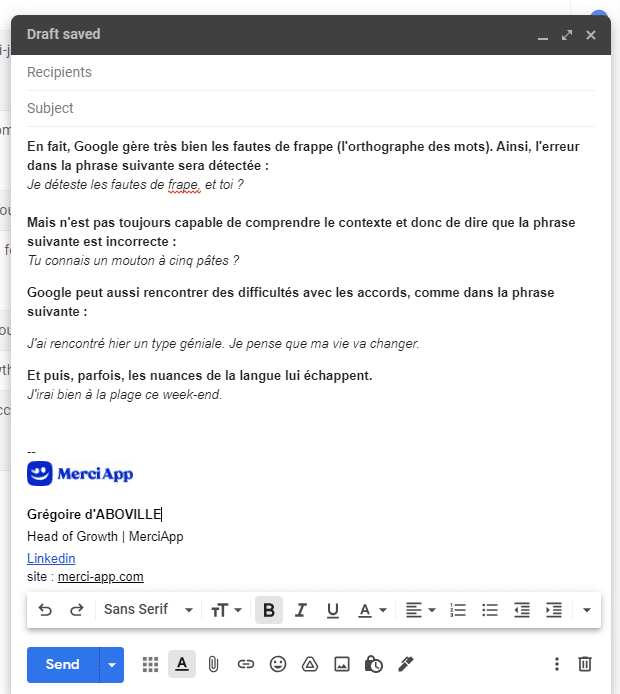
To recap, Google is quite capable of detecting misspelled words (here “frape”). But it has much more difficulties to identify agreement errors (“a great guy”) or errors related to the context (“j’irai bien”).
Let’s summarize what we have discovered so far.
Google explains via its spokespersons that spelling is not part of the official ranking criteria it uses to determine the quality of a content. An analysis of the spelling checkers offered in Google Docs and Google Mail confirms that technically Google is not able to offer a quality analysis of spelling.
Does this mean that spelling has no impact if Google cannot detect mistakes?
Direct and indirect impacts of spelling
In fact, if spelling is not part of the direct criteria used by Google, it has indirect impacts that can have concrete consequences on your referencing
Let’s see which ones.
The impact on links and PageRank
The first impact is related to backlinks. Many studies have proven the link between the number of links a page receives and its position in search results.
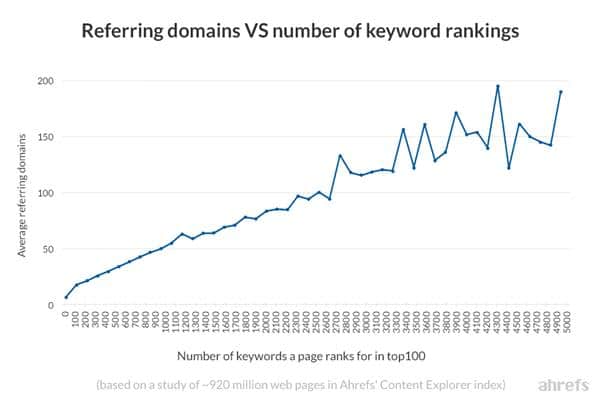
Source ahrefs blog
However, backlinks are mostly created by editors. We can assume that as professional writers, they are particularly sensitive to spelling and therefore more likely to create links to content without mistakes.
In other words, by leaving mistakes in your articles, you risk decreasing the chances that someone will link to them, and therefore they will rise to the top of the search results.
The impact on conversion
A 2014 Ipsos study (“Faute avouée, à moitié pardonnée”) indicated that 80% of respondents said they were shocked when they found a mistake on an advertisement or official communication medium.
Visitors to your site are therefore very likely to be shocked if they find errors in agreement, grammar or spelling on your site. And if they are shocked, they are unlikely to use your services or buy your products.
Unfortunately, to date, no serious study has proven the link between good spelling and conversion… But we can assume that there is a direct and strong link.
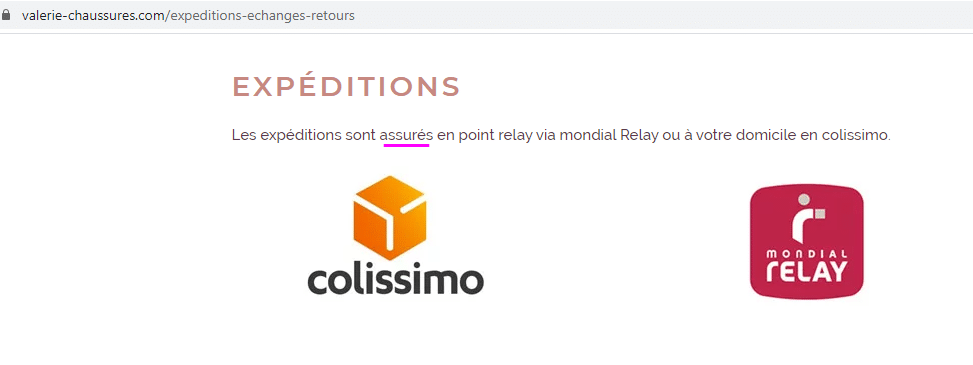
A spelling error does not inspire confidence on an e-commerce site
How to solve your spelling problems?
Now that we’ve convinced you of the importance of spelling in SEO, what can you do to improve your content?
Rest assured, there are solutions!
The first is to use a spell checker. If you don’t want to invest in a dedicated spell checker, you can always rely on the Microsoft Word spell checker or consult an online spell checker like Reverso or BonPatron. If you do want to invest in a dedicated tool, some advanced spell checkers like Antidote or MerciApp should help you identify and correct most of your mistakes.
The second is to review your basics. Most of the mistakes we make are indeed often the same. Reviewing the rules associated with the mistakes we make most often and rereading your written work will help you correct most of your mistakes.
Finally, the last possibility is to get help from a professional proofreader or a colleague. It’s worth the effort!
What are your tips for writing without mistakes?

